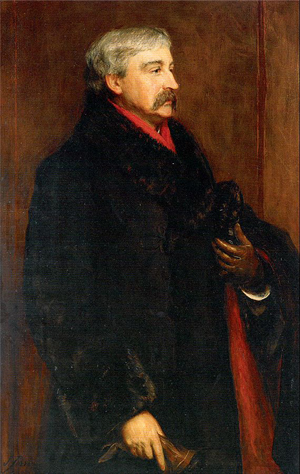Above the bones
St. Ursula owns,
And those of the virgins she chaperons;
Above the boats,
And the bridge that floats,
And the Rhine and the steamers’ smoky throats;
Above the chimneys and quaint-tiled roofs,
Above the clatter of wheels and hoofs;
Above Newmarket’s open space,
Above that consecrated place
Where the genuine bones of the Magi seen are,
And the dozen shops of the real Farina;
Higher than even old Hohestrasse,
Whose houses threaten the timid passer,—
Above them all,
Through scaffolds tall,
And spires like delicate limbs in splinters,
The great Cologne’s
Cathedral stones
Climb through the storms of eight hundred winters.
Unfinished there,
In high mid-air
The towers halt like a broken prayer;
Through years belated,
Unconsummated,
The hope of its architect quite frustrated.
Its very youth
They say, forsooth,
With a quite improper purpose mated;
And every stone
With a curse of its own
Instead of that sermon Shakespeare stated,
Since the day its choir,
Which all admire,
By Cologne’s Archbishop was consecrated.
Ah! THAT was a day,
One well might say,
To be marked with the largest, whitest stone
To be found in the towers of all Cologne!
Along the Rhine,
From old Rheinstein,
The people flowed like their own good wine.
From Rudesheim,
And Geisenheim,
And every spot that is known to rhyme;
From the famed Cat’s Castle of St. Goarshausen,
To the pictured roofs of Assmannshausen,
And down the track,
From quaint Schwalbach
To the clustering tiles of Bacharach;
From Bingen, hence
To old Coblentz:
From every castellated crag,
Where the robber chieftains kept their “swag,”
The folk flowed in, and Ober-Cassel
Shone with the pomp of knight and vassal;
And pouring in from near and far,
As the Rhine to its bosom draws the Ahr,
Or takes the arm of the sober Mosel,
So in Cologne, knight, squire, and losel,
Choked up the city’s gates with men
From old St. Stephen to Zint Marjen.
What had they come to see? Ah me!
I fear no glitter of pageantry,
Nor sacred zeal
For Church’s weal,
Nor faith in the virgins’ bones to heal;
Nor childlike trust in frank confession
Drew these, who, dyed in deep transgression,
Still in each nest
On every crest
Kept stolen goods in their possession;
But only their gout
For something new,
More rare than the “roast” of a wandering Jew;
Or—to be exact—
To see—in fact—
A Christian soul, in the very act
Of being damned, secundum artem,
By the devil, before a soul could part ’em.
For a rumor had flown
Throughout Cologne
That the church, in fact, was the devil’s own;
That its architect
(Being long “suspect”)
Had confessed to the Bishop that he had wrecked
Not only his OWN soul, but had lost
The VERY FIRST CHRISTIAN SOUL that crossed
The sacred threshold: and all, in fine,
For that very beautiful design
Of the wonderful choir
They were pleased to admire.
And really, he must be allowed to say—
To speak in a purely business way—
That, taking the ruling market prices
Of souls and churches, in such a crisis
It would be shown—
And his Grace must own—
It was really a BARGAIN for Cologne!
